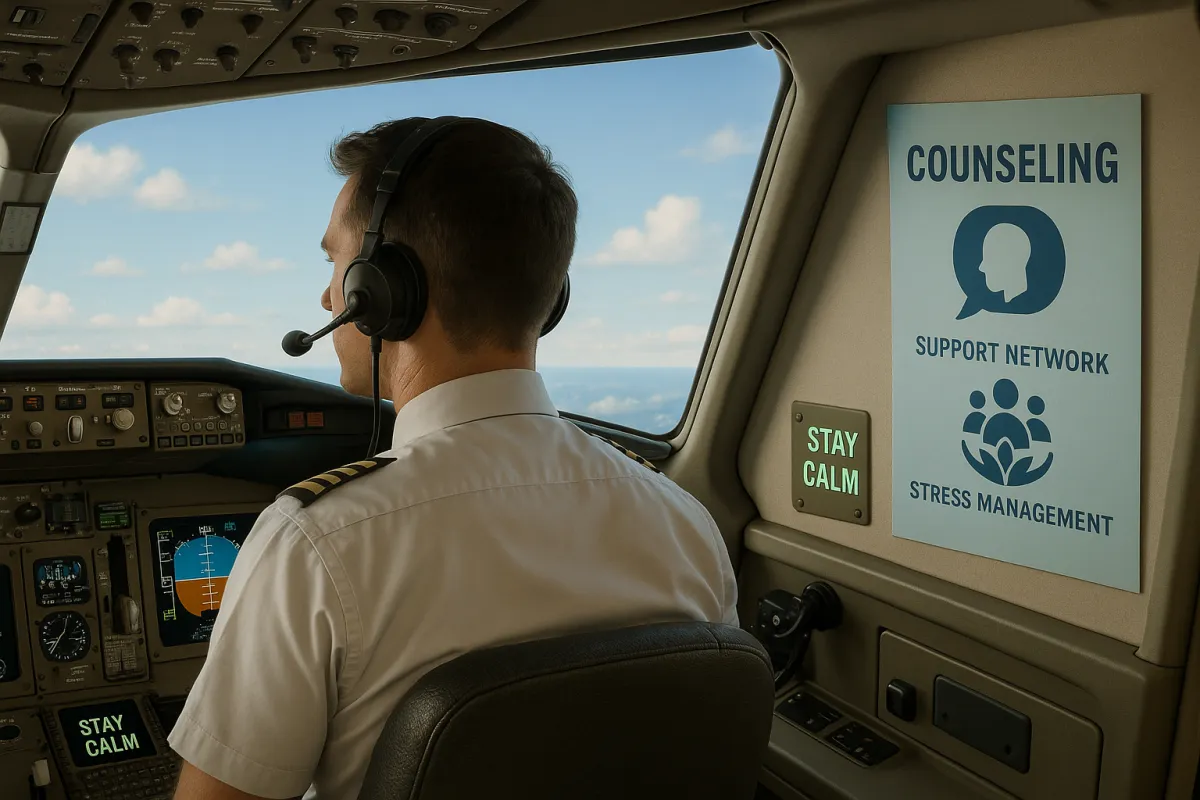Blog

Essential Coping Strategies for Pilot Mental Health
Pilot Mental Health Coping Strategies: Effective Techniques and Resources for Aviation Professionals
Your In-Flight Guide to Stress Management, Burnout Prevention, and Confidential Support
The skies may be calm, but a pilot's mind often isn't. Between tight schedules, long hours, constant vigilance, and the weight of responsibility, mental health challenges are increasingly common in aviation. Yet too often, these issues remain unspoken—silenced by fear, stigma, or misunderstanding about what seeking help means for a pilot's career.
The good news? Pilots don't have to navigate these challenges alone. There are practical, science-backed coping strategies and confidential resources that support both mental well-being and flight readiness. Clinicians like Stephen Rought, who specialize in aviation mental health, offer evidence-based therapy options tailored to the regulatory and cultural realities of flight crews and air traffic professionals.
What Are the Common Mental Health Challenges Faced by Pilots?
Pilots are not immune to the same psychological challenges that affect the broader population—if anything, the unique stressors of aviation increase their vulnerability. Common issues include:
•Chronic stress and anxiety disorders
•Burnout and fatigue
•Major depressive disorder
•Sleep disturbances and circadian rhythm disruption
•Substance abuse as a coping mechanism
•Fear of losing license or certification due to stigma or required disclosure
The cumulative effect of these conditions may impact not just the individual, but team dynamics and overall aviation safety.
What Causes Stress and Anxiety in Aviation Professionals?
•Irregular schedules and jet lag
•Extended duty periods and layovers away from family
•High-stakes decision-making under pressure
•Operational disruptions (weather, mechanical issues, passenger conflict)
•Occupational isolation and loneliness
•Fear of disclosing mental health concerns due to regulatory consequences
Understanding these triggers is the first step in choosing effective coping strategies.
How Can You Recognize Signs of Pilot Burnout?
Burnout doesn't happen all at once. Early indicators may include:
•Decreased motivation or detachment from the job
•Increased irritability, impatience, or withdrawal
•Persistent fatigue despite adequate rest
•Difficulty concentrating in pre-flight checks or briefings
•Feelings of ineffectiveness or cynicism
•Sleep disturbances and mood swings
Burnout is not a sign of weakness—it's a signal that mental health support and recovery are needed.
What Impact Does Mental Health Have on Flight Safety?
Mental health directly affects:
•Cognitive performance (memory, attention, decision-making)
•Communication and coordination in the cockpit
•Situational awareness during complex procedures
•Emotional regulation in high-pressure moments
•Risk perception and tolerance
Pilots struggling with unmanaged anxiety or burnout may experience degraded performance, delayed reactions, or decision fatigue—raising the risk of adverse events.
How Can Pilots Manage and Reduce Flight-Related Stress?
The key to managing stress is proactive, consistent practice, not waiting until symptoms escalate. Techniques include:
•Pre-flight mental preparation routines
•Structured post-flight decompression habits
•Access to peer support or check-ins
•Cognitive Behavioral Therapy (CBT) exercises
•Time management for more restorative downtime
What Are the Most Effective Stress Management Techniques for Pilots?
•Deep breathing and progressive muscle relaxation
•Mindfulness practices during flight cruise or layovers
•Cognitive restructuring to challenge fear-driven thoughts
•Scheduling protected time for recovery and sleep
•Peer discussion and mentorship for emotional processing
•Physical activity to regulate stress hormones
These strategies can help pilots stay alert, calm, and present.
How Do Relaxation Exercises Like Deep Breathing Help Pilots?
Relaxation exercises:
•Activate the parasympathetic nervous system
•Decrease heart rate and blood pressure
•Improve clarity and executive function
•Interrupt spiraling anxiety in real time
Box breathing (inhale-hold-exhale-hold, each for four seconds) is a pilot-friendly technique that can be practiced discreetly—even in the cockpit.
How Can Time Management Improve Work-Life Balance for Pilots?
Time management reduces mental fatigue by:
•Creating boundaries between duty and rest
•Protecting personal routines and relationships
•Allowing recovery periods before stressful events (e.g., check rides)
•Reducing the likelihood of decision overload
Pilots who prioritize rest, routine, and recovery are more resilient over time.
What Strategies Prevent and Recover From Pilot Burnout?
•Recognize early warning signs without shame
•Schedule vacation and personal time proactively
•Use peer support networks before crisis hits
•Build a personal stress-reduction toolkit: music, breathing, reading, or walks
•Seek individual counseling or therapy confidentially
Recovery from burnout may also include re-evaluating workload, base location, or route assignments with employer support.
How Can Pilots Identify Early Symptoms of Burnout?
Use checklists like:
•"Am I enjoying this role less than I used to?"
•"Is my patience thinner with co-workers or family?"
•"Do I feel emotionally flat or irritable more days than not?"
•"Is sleep no longer refreshing?"
•"Have I lost interest in hobbies or downtime?"
These questions mirror self-assessments used in mental health questionnaires like the PHQ-9 and Maslach Burnout Inventory.
What Are Proven Methods to Build Resilience in Pilots?
•Cognitive Behavioral Therapy (CBT) for emotional regulation
•Social connection with supportive peers
•Healthy lifestyle habits (sleep, nutrition, hydration)
•Acceptance-based approaches (e.g., ACT, mindfulness)
•Purpose-building activities beyond aviation
•Stress inoculation training and scenario planning
Resilience isn't avoidance—it's the ability to recover with strength.
How Does Peer Support Contribute to Burnout Prevention?
Pilots often find comfort in talking to someone who "gets it." Peer support:
•Breaks isolation and stigma
•Encourages early intervention
•Provides access to shared strategies and insight
•Helps normalize emotional reactions to difficult flights or life stressors
Many airlines and pilot unions now offer confidential peer support programs, such as ALPA's Pilot Peer Support network.
Where Can Pilots Find Specialized Mental Health Resources and Support?
Confidential counseling services:
•Licensed mental health professionals with aviation experience
•FAA- and HIMS-certified providers for reportable cases
•Couples therapy options for pilots and partners dealing with travel-related strain
Online resources:
•Apps like Sanvello, Moodfit, or Headspace
•CBT-based tools with tracking and journaling
•Educational content licensed under Creative Commons for aviation wellness
How to Find Confidential Counseling and Therapy for Pilots?
•Use platforms like Psychology Today, TherapyDen, or your EAP
•Filter by specialty (e.g., aviation, PTSD, performance anxiety)
•Clarify confidentiality policies and reporting obligations
•Ensure the provider understands FAA medical clearance concerns
You retain the right to informed consent, privacy, and non-judgmental care.
What Online Mental Health Resources Are Available for Aviation Professionals?
•Virtual telehealth counseling platforms with aviation-informed therapists
•CBT modules designed for shift work and remote access
•FAA and EASA mental health toolkits
•Peer-led forums and networks for emotional check-ins
•Anonymous apps with self-assessments, symptom trackers, and guided exercises
These tools enhance access, adherence, and convenience.
How Do Peer Support Groups Help Pilot Mental Well-Being?
Peer groups:
•Foster trust through shared experiences
•Offer non-clinical emotional support
•Help identify early signs of anxiety, depression, or substance misuse
•Encourage help-seeking before performance is compromised
Participation is usually voluntary and non-reportable unless there is an immediate safety concern.
How Can Mindfulness and Well-Being Practices Improve Pilot Mental Health?
Mindfulness improves:
•Focus and situational awareness
•Impulse control under pressure
•Recovery after in-flight disruptions
•Management of pre-flight nervousness or intrusive thoughts
Even short 3- to 5-minute mindfulness practices can re-center a pilot before key flight phases.
What Is Mindfulness and How Can Pilots Practice It?
Mindfulness is the act of paying attention—intentionally and nonjudgmentally—to the present moment. Pilots can practice by:
•Noticing sensations in the seat before takeoff
•Doing a brief body scan during cruise
•Using a breath focus cue before making PA announcements
•Observing thoughts without reacting during delays or reroutes
Which Mindfulness Exercises Are Suitable for In-Flight Use?
•Box breathing
•Anchoring to physical sensations (feet, breath, posture)
•Micro-meditation (10–30 seconds) while monitoring instruments
•Mantra repetition or "thought labeling" for worry management
These tools are discreet, effective, and help stabilize emotion and attention.
What Are the Benefits of Meditation for Pilots' Mental Health?
Research supports meditation's role in:
•Reducing stress hormones
•Improving attention span and memory
•Lowering risk of depression and anxiety disorders
•Enhancing emotional regulation and cognitive resilience
Regular meditation is correlated with lower burnout rates in high-stakes professions.
How Can Cognitive Behavioral Techniques Help Pilots Manage Stress?
CBT helps pilots:
•Identify and reframe distorted thinking patterns (e.g., catastrophizing)
•Use thought records to analyze performance self-criticism
•Reduce avoidance behaviors that reinforce anxiety
•Reinforce confident self-talk and real-time emotion regulation
Are There Self-Assessment Tools for Pilot Stress and Anxiety?
Yes, including:
•Patient Health Questionnaire (PHQ-9) for depression
•Generalized Anxiety Disorder scale (GAD-7)
•Burnout checklists used in peer programs
•Airline-provided wellness surveys and tracking forms
Pilots can use these tools to determine when to seek support.
Why Is Confidentiality Critical for Pilots Seeking Help?
•Fear of losing medical certification or career advancement
•Concern about being removed from duty unnecessarily
•Anxiety about peer or management judgment
•Legal and ethical implications of data handling
Confidentiality builds trust and ensures pilots get help before safety is impacted.
How Do Aviation Mental Health Programs Ensure Privacy?
•Use of HIPAA-compliant platforms
•Anonymous screening tools and referrals
•Limited required reporting to FAA or employer unless safety is at risk
•Use of peer support outside the medical certification pathway
Programs are designed to support pilots—not penalize them.
What Are the Options for Anonymous or Remote Support?
•Virtual therapy using aliases or non-disclosing accounts
•Text-based mental health apps
•Peer hotlines run by unions or nonprofits
•Open access educational materials licensed for private use
•Self-guided CBT or mindfulness platforms
Conclusion: You're Not Alone at 35,000 Feet
Mental health is as vital as your altimeter or autopilot—it helps you stay balanced, aware, and in control. Whether you're dealing with low-level stress or significant burnout, there are tools, people, and programs ready to support you. And most importantly, you can seek help confidentially, professionally, and without fear.
You check your aircraft before every flight—your mind deserves the same care.

Stephen Rought, LCSW
Proudly Accepting
Aetna and Medicare Insurance


Disclaimer
Stephen Rought, LCSW does not guarantee any specific outcome. All content provided on the Stephen Rought, LCSW website is provided for educational or informational purposes only. Consult medical professionals you are working with about whether any opinions or recommendations provided through this website apply to you and your unique circumstances
Currently, all online therapy sessions are conducted using the HIPPA compliant Telehealth service doxy.me
SErvices
Individual Therapy
Parent Coaching
Financial Therapy
Couples Counseling
Family Therapy
